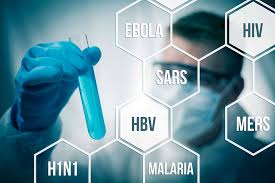
What is it?
The campus Exposure Control Plan is designed to protect workers from the occupational transmission of diseases potentially present in blood, bodily fluids, and aerosol transmission. Employees at risk of exposure must have:
- Training
- Access to Hepatitis B vaccinations
- Personal protective equipment (PPE)

All potentially exposed employees are required to follow the concept of Universal Precautions, which includes the following practices:
- Treat all blood and other potentially infectious body fluids as if infected
- Avoid direct contact with blood and body fluids & contaminated materials
- Wear PPE appropriate for job
- Practice good housekeeping and personal hygiene
Bloodborne pathogens (BBP) are infectious microorganisms in human blood that can cause disease in humans. These pathogens include, but are not limited to, hepatitis B (HBV), hepatitis C (HCV) and human immunodeficiency virus (HIV).
An Aerosol Transmissible Disease (ATD) is a disease that is transmitted by aerosols(a gaseous suspension of fine, solid or liquid particles).
Resources:
View Exposure Control documents on SharePoint:
- Exposure Control BBP Plan
- Flu Season (ATD)
- COVID-19 (ATD)
- HBV Vaccination Declination Form
- Flu Vaccination Declination Form
- ATD Vaccination Declination Form
- Sharps Incident Form
Updated: December 14, 2023